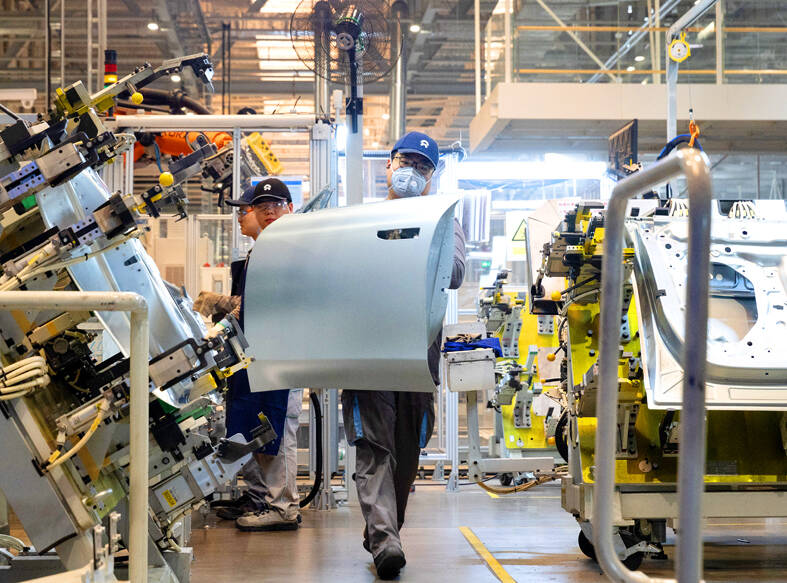Profits at China’s industrial firms rebounded last month, driven by a boost in income from the high-technology manufacturing sector and signaling economic resilience amid trade tensions with the US.
Industrial profits rose by 2.6 percent from a year earlier, taking the gain for the first quarter to 0.8 percent, data released by the Chinese National Bureau of Statistics showed yesterday. Last month’s data compares with a 0.3 percent contraction for the first two months.
A turnaround in industrial profit is regarded as critical in lifting business confidence, and encouraging companies to invest and hire to help the Chinese government achieve its reiterated commitment to achieve about 5 percent economic growth this year.

Photo: EPA-EFE
High-technology focused manufacturers’ profit rose 3.5 percent in the quarter, reversing a 5.8 percent decline in the first two months of the year. Almost three-fifths of industrial sectors recorded profit growth last month, the statement said.
China on Friday said it would “fully prepare” emergency plans to protect the nation against increasing external shocks, as it defends its growth goals amid a deepening trade war with the US that is challenging the world’s No. 2 economy.
The country’s decisionmaking politburo pledged to create new monetary and policy tools to boost technology, consumption and trade. Such steps could allow for faster deployment of low-cost credit for investment in targeted areas.
“Incremental and existing policies have worked in concert, enabling the industrial economy to get off to a good start,” bureau analyst Yu Weining (于衛寧) said in a statement. “At this stage, the external environment has become more complex and severe, with an increase in unstable and uncertain factors.”
Separately, China yesterday said that it would lower the tax rebate threshold for foreigners visiting the country, an effort to boost consumption, as Beijing attempts to offset some of the damage of the trade war.
Tourists who spend at least 200 yuan (US$27.4) on the same day at the same store would be eligible for the rebate, according to a joint statement from the Chinese Ministry of Finance, the People’s Bank of China and other government departments.
The maximum rebate amount for cash claims would be increased to 20,000 yuan, it added.
The government would also expand the list of eligible tax-refund stores and streamline procedures to make it easier for tourists to claim the rebate, the joint statement said.

NO BREAKTHROUGH? More substantial ‘deliverables,’ such as tariff reductions, would likely be saved for a meeting between Trump and Xi later this year, a trade expert said China launched two probes targeting the US semiconductor sector on Saturday ahead of talks between the two nations in Spain this week on trade, national security and the ownership of social media platform TikTok. China’s Ministry of Commerce announced an anti-dumping investigation into certain analog integrated circuits (ICs) imported from the US. The investigation is to target some commodity interface ICs and gate driver ICs, which are commonly made by US companies such as Texas Instruments Inc and ON Semiconductor Corp. The ministry also announced an anti-discrimination probe into US measures against China’s chip sector. US measures such as export curbs and tariffs

The US on Friday penalized two Chinese firms that acquired US chipmaking equipment for China’s top chipmaker, Semiconductor Manufacturing International Corp (SMIC, 中芯國際), including them among 32 entities that were added to the US Department of Commerce’s restricted trade list, a US government posting showed. Twenty-three of the 32 are in China. GMC Semiconductor Technology (Wuxi) Co (吉姆西半導體科技) and Jicun Semiconductor Technology (Shanghai) Co (吉存半導體科技) were placed on the list, formally known as the Entity List, for acquiring equipment for SMIC Northern Integrated Circuit Manufacturing (Beijing) Corp (中芯北方積體電路) and Semiconductor Manufacturing International (Beijing) Corp (中芯北京), the US Federal Register posting said. The

India’s ban of online money-based games could drive addicts to unregulated apps and offshore platforms that pose new financial and social risks, fantasy-sports gaming experts say. Indian Prime Minister Narendra Modi’s government banned real-money online games late last month, citing financial losses and addiction, leading to a shutdown of many apps offering paid fantasy cricket, rummy and poker games. “Many will move to offshore platforms, because of the addictive nature — they will find alternate means to get that dopamine hit,” said Viren Hemrajani, a Mumbai-based fantasy cricket analyst. “It [also] leads to fraud and scams, because everything is now

MORTGAGE WORRIES: About 34% of respondents to a survey said they would approach multiple lenders to pay for a home, while 29.2% said they would ask family for help New housing projects in Taiwan’s six special municipalities, as well as Hsinchu city and county, are projected to total NT$710.65 billion (US$23.61 billion) in the upcoming fall sales season, a record 30 percent decrease from a year earlier, as tighter mortgage rules prompt developers to pull back, property listing platform 591.com (591新建案) said yesterday. The number of projects has also fallen to 312, a more than 20 percent decrease year-on-year, underscoring weakening sentiment and momentum amid lingering policy and financing headwinds. New Taipei City and Taoyuan bucked the downturn in project value, while Taipei, Hsinchu city and county, Taichung, Tainan and Kaohsiung